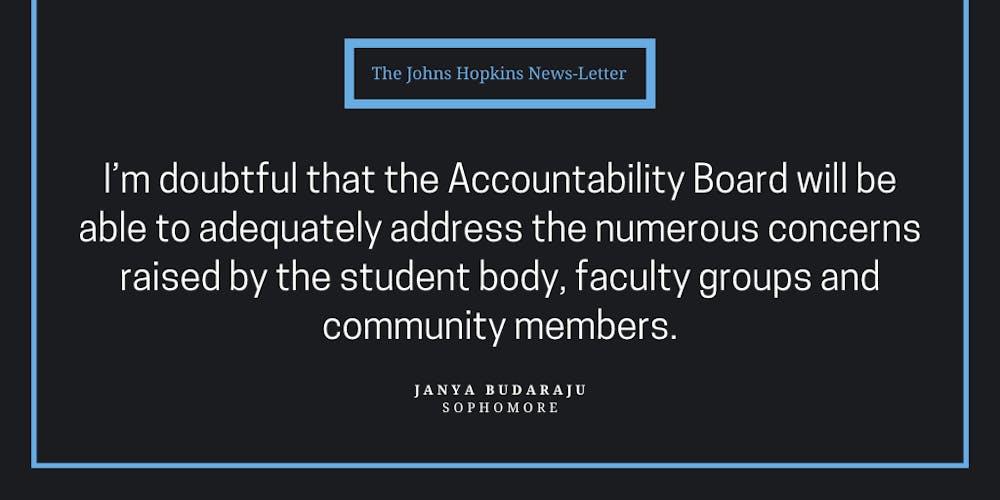The Johns Hopkins University Police Accountability Board (JH Accountability Board) was originally created in February 2020 as a result of the Interim Study on Approaches to Improving Public Safety On and Around Johns Hopkins University Campuses.
The Maryland General Assembly passed the Community Safety and Strengthening Act during the 2019 legislative session, positioning the Accountability Board as an opportunity for Hopkins community members and members of surrounding neighborhoods to help shape the implementation of the Johns Hopkins Police Department (JHPD).
In an email to The News-Letter, Assistant Vice President for Media Relations and News J.B. Bird explained the role the JH Accountability Board will play in the Hopkins community.
“The JH Accountability Board originated as one of several university recommendations in the Interim Study… and reflects both community input and research into best practices among police departments nationally,” he wrote. “The board will play a pivotal role in the coming year in advising the university as it develops the policies and procedures needed for the anticipated launch of the JHPD in 2023.”
Due to nationwide protests against racism and police brutality in 2020, the University announced the implementation of the JHPD would be suspended for at least two years, causing the JH Accountability Board to be put on a temporary pause.
Bird shared that the Accountability Board was created in statute and has a clear role in how it will advise the University regarding the JHPD.
“Accountability Board members are statutorily charged with sharing community feedback directly with JHPD leadership, reviewing JHPD metrics involving crime, and assessing current and prospective department policies, procedures, and training in order to provide recommendations for improvement,” he wrote.
Bird emphasized that once the Memorandum of Understanding process concludes, the University will begin to develop JHPD policies in compliance with the Baltimore City Consent Decree. The JH Accountability Board will play a crucial role as the University develops policing practices for the police force.
In an email to The News-Letter, PhD student and Accountability Board Member Michael Wilkinson noted how the board serves as a public-facing body willing to speak to the community to better understand concerns and provide clarity concerning the JHPD.
“Part of our mandate is to host an annual public town hall to discuss with the community but we have been discussing hosting more than just one public conversation a year as we feel community engagement is important,” he wrote. “We feel it is our role to both advise the JHPD and to keep the JHU community in the loop as to the current issues we are trying to address and what steps we are taking to address them.”
The JH Accountability board is composed of five community members unaffiliated with the University and 10 students, faculty members and staff. University representatives are drawn from across the three campuses where the JHPD will operate: East Baltimore, Homewood and Peabody. Additionally, the Accountability Board will include at least one member from the Johns Hopkins Black Faculty and Staff Association.
Bird highlighted that the Accountability Board has 11 current or pending vacancies that need to be filled, four of which are set aside for student members.
“We are hoping to fill those seats with engaged community members who have diverse perspectives and backgrounds,” he wrote. “The deadline to apply is Nov. 7; applications can be completed online.”
In an interview with The News-Letter, sophomore Janya Budaraju explained that while the student body has received several emails encouraging them to apply to join the Accountability Board, she believes it is not clear how the Board holds the JHPD accountable.
“There’s a lot of material clarifying the application and nomination process, but none relating to the actual capacity of the Board to enact meaningful change other than simply sharing concerns with leadership,” she said. “Previous Board members (as well as student and faculty groups) have expressed skepticism and even resigned over concerns about the effectiveness of the board — but to my knowledge the University has not taken any steps to acknowledge this criticism nor to alter the structure of the board.”
Budaraju raised doubts in whether the Accountability Board will be able to adequately address the concerns of community members.
“Given all of these factors as well as the legacy of policing in the U.S., in Baltimore, on other college campuses, and at Hopkins itself, I’m doubtful that the Accountability Board will be able to adequately address the numerous concerns raised by the student body, faculty groups and community members about having a privatized campus police force,“ she said.





